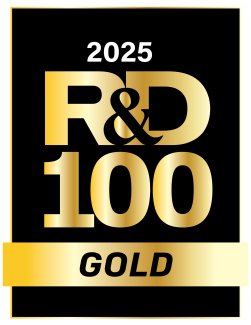NETL researchers who discovered transformational technologies to produce high-quality synthetic graphite from plastics, convert wastes and biomass into fuels and chemicals, and find critical minerals using a new revolutionary sensor were named winners in the prestigious R&D 100 Awards competition.
Now in its 63rd year, this renowned global science and innovation competition recognizes technologies that have moved from laboratory concepts to market-ready breakthroughs. The 2025 contest drew entries from 13 countries or regions. Winners will be formally honored at the R&D 100 Awards Banquet on Nov. 20 at the Marriott at McDowell Mountains in Scottsdale, Arizona.
NETL’s winning projects and researchers were:
- Plastic Upcycled Synthetic Graphite (PLUS-Graphite). A winner in the Mechanical/Materials category, PLUS-Graphite was developed by Christopher Matranga, Ki-Joong Kim, Ngoc Tien Huynh, Yuan Gao, Viet Pham and Congjun Wang.
PLUS-Graphite is a high-quality synthetic graphite made from waste polyethylene (PE). The technology transforms PE waste into highly crystalline graphite powder needed to produce lithium-ion batteries for trains and vehicles, military drones, space exploration probes, emergency backup power systems, tools and many other devices. The technology also diverts single-use plastics and other PE waste from the world’s oceans and landfills into the manufacturing sector.
The NETL Carbon Materials Manufacturing Team created this technology in less than 24 months and on a total budget of $350,000. Funding was provided by NETL’s Laboratory Directed Research and Development program to catalyze the development of high-risk, high-reward technologies that advance the U.S. Department of Energy’s mission.
- Microwave-Assisted Solids-to-Fuels & Chemical Conversion (MAST-FCC). A winner in the Process/Prototyping category, MAST-FCC was developed by Dushyant Shekhawat, Christina Wildfire, Ashraf Abedin, Xinwei Bai and Pranjali Muley.
NETL’s Center for Microwave Chemistry developed the technology to convert solid feedstocks, including biomass, coal and municipal solid waste, to fuels and chemicals.
The system seamlessly combines process intensification with scalable design to offer unparalleled flexibility and energy efficiency. By tuning process conditions and reactor configurations, the technology can be tailored to produce a range of valuable end products — from clean hydrogen and syngas to specific hydrocarbons and chemical precursors.
The process operates through direct interaction of the solid feedstock with electromagnetic waves, increasing the energy efficiency by 60% and decreasing reaction times by up to threefold. The result is a system with highly promising economics (lower capital and operating costs), simplified infrastructure and ability to monetize low-value feedstock. The technology has been transferred to industrial partners for commercial scale operations.
- eMission Critical Sensor. A winner in the IT/Electrical category, eMission Critical Senor was developed by a team led by Paul Ohodnicki of the University of Pittsburgh and NETL’s Scott Crawford. Other team members were NETL’s John Ahern, John Baltrus, Ki-Joong Kim and Ward Burgess.
The technology is a highly sensitive and selective probe for detecting critical minerals. It couples a compact, proven fiber-optic excitation and detection platform with high-performance luminescent materials that provide a selective optical response in the presence of target materials.
Using the technology, critical minerals can be detected at low parts-per-million concentrations in complex systems, such as fly ash leachates, extraction process streams and acid mine drainage. Critical minerals are needed to produce electronics, batteries for electric vehicles, defense systems and other components to protect U.S. economic, energy and national security.
The developer of the technology is the University of Pittsburgh, with NETL and Sensible Photonics listed as co-developers.
NETL is a U.S. Department of Energy (DOE) national laboratory dedicated to advancing the nation’s energy future by creating innovative solutions that strengthen the security, affordability and reliability of energy systems and natural resources. With laboratories in Albany, Oregon; Morgantown, West Virginia; and Pittsburgh, Pennsylvania, NETL creates advanced energy technologies that support DOE’s mission while fostering collaborations that will lead to a resilient and abundant energy future for the nation.




